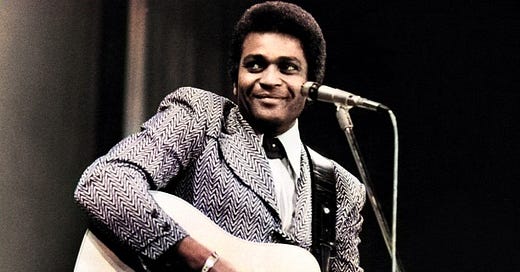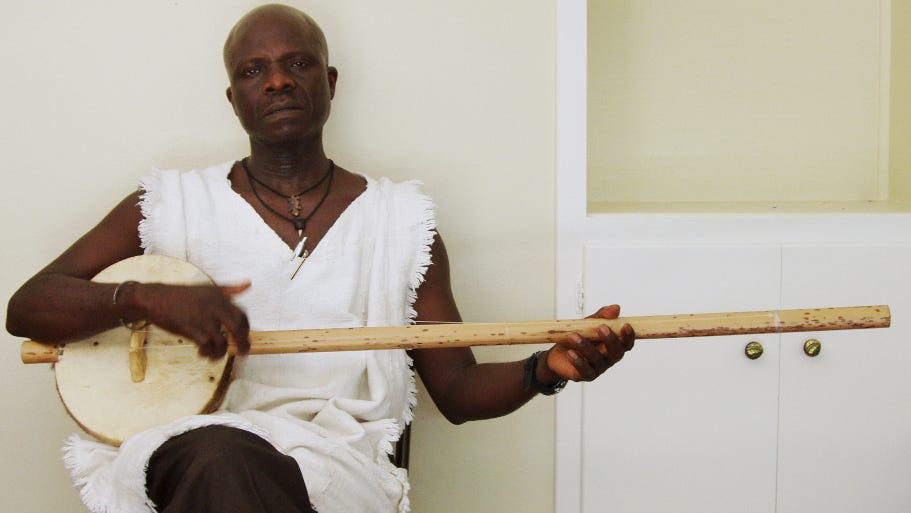If you enjoy these Black History stories and want to keep discovering more, consider becoming a subscriber today. Your support helps me share these important narratives with even more people.
The Untold Story of Black Influence in Country Music
Country music, birthed in America's scenic southern rural landscapes, is commonly viewed as the soundtrack of white, rural life. Its melodies resonate with the life experiences and emotions of white Americans - spinning relatable tales of love, sorrow, and a simple life. The portrayal of country music in the media, furthers this narrative.
In actually, It’s humble roots are actually entwined in the rich, diverse tapestry of Black musical styles and traditions, it's essentially a soundtrack curated from the vibrant legacies of Black musicians in the American South.
Origins: The African Roots Behind the Twang
When you think "Country music," images of cowboys, open fields, or rural white America often come to mind. But this music genre has a much richer, more diverse origin story tucked away:
Did you know? The banjo, a quintessential instrument in country music, actually originated in West Africa.
These early banjos were made using gourds and had a special design with a drum-like body and strings of different lengths
Brought to the American South by enslaved Africans, the banjo was initially crafted with African designs blended with European string influences to make the instrument we see today.
However, despite these clear African roots, by the mid-1800s white artists began appropriating the banjo particularly through racially charged minstrel shows establishing a narrative that sidelined Black influences for many decades.
Black Artists Who Shaped Country Music
Black musicians profoundly shaped early country music, infusing it with spirituals, work songs, and blues melodies. Yet the genre eventually became commercially divided:
In the mid-20th century, "hillbilly music," now known as “country music,” became popular, especially among white folks in the south. Major record companies saw a chance to make a profit but felt that it could only take off as a strictly white genre. So, Black artists who contributed significantly were no longer acknowledged, and album covers only showcased white musicians, marketing country music as "white". This perception intensified when white southerners migrated north, taking country music with them.
American record labels strictly classified music as either "race music" (targeting Black audiences) or "hillbilly music" (marketed mainly to white consumers).
However, despite this imposed racial divide, Black artists continued influencing the genre, commonly without proper recognition.
Trailblazing yet Overlooked; DeFord Bailey
The first Black star at the legendary Grand Ole Opry.
Despite widespread fame, Bailey faced segregation and discrimination throughout his career and was fired from the Grand Ole Opry in 1941
“Like some members of his race and others, DeFord was lazy. He knew about a dozen numbers, which he put on the air and recorded for a major company, but he refused to learn any more, even though the reward was great. He was our mascot and is still loved by the entire company.”
-George Hay
Breaking Barriers in the Spotlight
In the late 1960s and 70s, notable Black artists began publicly challenging the racial boundaries of the country music world:
Charley Pride Became country music’s first major Black star in the 1960s, achieving mainstream success amid fierce systemic obstacles.
Ray Charles Amazingly blended country music with soul and R&B, using his sound to break racial barriers and to support the civil rights cause.
Black Women in Country:
Linda Martell In 1970, Martell shattered industry glass ceilings as the first commercially successful Black woman in country music.
Yet, despite Martell’s barrier-breaking achievements, opportunities remain scarce even today over two decades, Black women represent only 0.03% of artists played on country radio.
"Genres are a funny little concept, aren't they? In theory, they have a simple definition that's easy to understand, but in practice, well, some may feel confined,"
- Linda Martell
The Future: Reclaiming the Narrative
Today’s country scene is undeniably infused with diverse cultural influences—from hip-hop beats to R&B elements further underscoring the genre's deep roots and broad influences.
But the journey toward true inclusivity continues:
Initiatives like the Black Opry have emerged, spotlighting Black artists, challenging racial exclusivity, and broadening country music’s welcoming embrace.
"There's such a variety within Black country music," “This diversity is what I hope others will ultimately see and appreciate."
- Holly G from Black Opry
What it All Means: Honoring Black Legacies
Understanding the Black roots of country music helps create a more complete, inclusive narrative. It's more than musical history; it's cultural reintegration and recognition of an overlooked legacy.
From forgotten instruments in Africa to segregated stages in Tennessee, from early struggles of DeFord Bailey to Charley Pride’s breakthrough, this rich tapestry of Black contributions defines and enriches country music today.
"As a country music fan, I didn’t feel safe in country music spaces. It doesn’t surprise me that Black people have been hesitant to be part of this space."
- Holly G from Black Opry
Thank you for joining us today. For more engaging stories, visit One Mic History. Your continued support is greatly appreciated, enjoy our latest episode. We love you all.
-Countryboi








